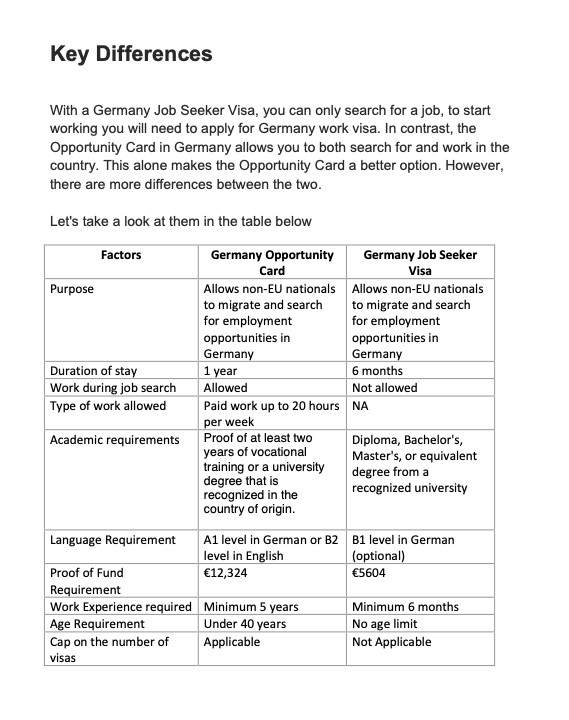Call us now:
Opportunity Card Germany

Introduction to the opportunity Card
The introduction of the opportunity card in accordance with Section 20a of the Residence Act (AufenthG) for skilled workers seeking employment on June 1, 2024 represents an important step for Germany in shaping its migration policy.
As a key component of the new Skilled Immigration Act, which will come into force in November 2023, this innovation gives you, as a qualified non-EU citizen, the opportunity to enter Germany on the basis of a points system, even if you do not yet have a permanent employment contract.
What is the opportunity Card?
The opportunity card is a new element of the German Skilled Immigration Act, which is specifically designed to make it easier for you as a qualified non-EU citizen to access the German labor market.
Thanks to a detailed points system that takes into account factors such as your professional experience, your level of education and your language skills, the Chancenkarte enables you to come to Germany flexibly and independently and to build up a professional life here.
With the opportunity card, you can search for a job that matches your qualifications directly on site. This system reflects Germany’s desire to actively combat the shortage of skilled workers and strengthen its economy by attracting highly qualified professionals.
Points distribution for the Opportunity Card at a glance
With the Opportunity Card (“Chancenkarte”), candidates from non-EU countries can enter Germany to look for a suitable job. They do not have to show proof of a permanent employment contract. The Opportunity Card is issued to candidates recognised as skilled workers or those who score at least six points using the points system. In addition, their means of support must be guaranteed for the duration of their stay.
- Basic requirements: Sufficient German language skills at level A1 or English language skills at level B2 as well as at least two years of vocational training according to the rules of the country of origin. You must also have sufficient financial means. Proof of this can be in the form of an employment contract for a part-time job (up to 20 hours per week), for example.
- Four points are awarded for partial recognition of a foreign professional qualification or for permission to practise a regulated profession (e.g. teacher, nurse or engineer). Very few applicants meet these criteria.
- Three points are awarded for five years of professional experience (in the last seven years) in the learned profession as well as a preceding two years of professional training according to the rules of the country of origin. Alternatively, you receive three points for good German language skills at level B2.
- Two points are awarded for two years’ professional experience preceded by vocational training (in the last five years). If you are not older than 35, you also get two points. German language skills at level B1 are also awarded two points.
- One point is awarded to applicants who are not over 40 years old and for a previous stay in Germany (at least six months). You must provide documented proof of this. Previous stays as a tourist do not count.
- One point is also awarded for very good knowledge of English (C1), reasonable knowledge of German (A2), if you had your vocational training/university degree in an area of official labor shortage in Germany, or if you apply for the Opportunity Card together with your spouse.
Key advantages of the Opportunity Card
1)Easy and fast entry into Germany is possible: If you apply for the Opportunity Card, you do not require a permanent employment contract in advance. You can simply use the points system to prove your existing qualifications (e.g. language skills or work experience). This eliminates the need for a complicated examination procedure. The Opportunity Card permits you to stay in Germany for one year to look for a suitable job. Part-time or casual jobs of up to 20 hours a week are possible, as well as two-week trial jobs. With the Opportunity Card, you can get to know your new employer at your leisure and look for a job that suits you and your qualifications.
2)Possibility of permanent residence in Germany: The residence permit with the Opportunity Card is limited to one year as its primary purpose is for you to find a job. In addition to an unlimited number of trial jobs, part-time jobs of up to 20 hours a week are also possible, which can be divided up flexibly. Once you have found a suitable job, it is possible to extend your stay. For this purpose, you must also submit an application to the competent Foreigners’ Registration Office. If you intend to change from part-time to a full-time job, you have a good chance of obtaining a longer residence title. This is also possible if you wish to remain in part-time employment. Written proof, such as an agreement with your employer or a permanent employment contract, is important for extending your stay in Germany.
3)Securing your livelihood with a good income: The Opportunity Card allows part-time employment on the basis of the minimum wage (or above). This is currently 12.00 euros gross per hour (as of May 2023). With a part-time job (20 hours per week), you can earn above 1000 euros per month. If you want to change to a full-time job, your net income will rise to well over 1000 euros a month. The earning potential depends on the sector you want to work in and your qualifications. With the Opportunity Card, you have a good chance of earning a fair wage so you can easily finance your everyday life in Germany.
4)Guaranteed work permit: Until now, workers from non-EU countries have needed a visa to enter Germany and work here. This requires an existing job offer as the Federal Employment Agency often has to approve your stay. If you are not a recognised skilled worker, you can come to Germany with the Opportunity Card to look for a job locally. The basic requirement is (at least) two years of vocational training or a university degree according to the rules of your country of origin. In addition, you must have basic knowledge of German (A1) or English (B2) and also be able to prove this. To receive the Opportunity Card, you must also have sufficient financial means to secure your livelihood independently. This is usually possible with a part-time job (up to 20 hours per week).
5)Good chance of a qualified part-time/full-time job: As part of the Opportunity Card, you have the possibility to apply for two-week trial work (an unlimited number of times) or part-time work of up to 20 hours a week. If you find suitable employment during your stay, you have the prospect of a qualified part-time or full-time job. In order to be able to seek a full-time job in the future, you must change your residence title. The Opportunity Card only authorises you to look for a job in Germany. For a longer stay, you must apply for a corresponding residence title at your local Foreigners’ Registration Office. This should not be a problem if you can show proof of a future job offer or an employment contract.
Key Differences
With a Germany Job Seeker Visa, you can only search for a job, to start
working you will need to apply for Germany work visa. In contrast, the
Opportunity Card in Germany allows you to both search for and work in the
country. This alone makes the Opportunity Card a better option. However,
there are more differences between the two.




